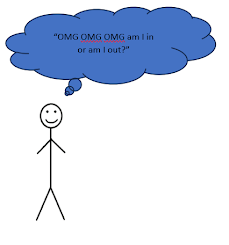SERMON
PREACHED AT St PETER’S, ARROWTOWN
St
PAUL’S, QUEENSTOWN, and THE GLENORCHY MISSION HALL
21tst
ORDINARY SUNDAY (August 27th) 2023
READINGS:
Exodus
1: 8 – 2: 10
Psalm
124
Rom 12: 1-8
Matthew 16: 13-20
Biblical
theologians like to bandy around the theological term “Christological question”
to describe this interaction between Jesus and Peter. Often in doing so they
load the encounter with existential terror.
If we were writing what I suppose now is
called an “X” rather than a “tweet,” we would load the text with strings of OMG
emojis. If we were drawing a cartoon we might have a thought-bubble doing the
same thing.
But
to see it that way is to overload this moment. This not about saying the right
words.
Let’s
remember that the words and actions of Jesus and Peter are being recounted by
Matthew. He has his own criteria as he
tells the Jesus story.
Peter
here becomes the first disciple to use the term “Christ,” though Matthew has
used it several times in his story. He adds an equally solemn term, its
reference more Roman than Jewish: “son of the living God.” Dictators of the
ancient world enjoyed that sort of language.
Peter
is laying it on. Given the brash figure he was he was probably rejoicing in his
own sudden insight, but the phrase could equally be obsequious, fawning around
like an Obadiah Slope or dare I say it a Rudy Giuliani, prostrating himself at
his master’s feet. Either way he’s got it badly wrong. John’s Gospel-account
recalls Jesus saying, again to Peter, “You do not realize now what I am doing,
but later you will understand.”
So, yup. Peter’s words are right. Dramatically right. But they approach what in my broadcasting days we used to call “process language.” The right words are there, but they remain devoid of meaning. So Jesus says – as he often does in Mark’s gospel-account, “Shh, don’t tell anyone.” Biblical theologians call that “the messianic secret,” by the way.
Ironically
the unnamed but desperate woman a couple of scenes earlier got it right. No
hollow syllables from her, as she cried out for her daughter to be saved. She
shouldn’t even have been talking to this foreign healer Jesus. But desperation
yelled within her soul. No nice formulae, just desperation.
Ironically
Peter did gets there, on another occasion: “Lord Help me” he cried out as he
was sinking in the lake. But by now he’s forgotten that desperation. We can be
almost certain that the woman whose daughter Jesus healed did not forget. And
she was an outsider, one against whom the church would too often lock its
doors.
Nor
in the end did Peter forget. Not in the end. He did become in some strange way
the rock on whom Jesus founded the church. But first he had to see and own his
own weakness. He had to realise that he could deny his leader, desert his leader,
and even after the resurrection remain sceptical until the integrity of the
women’s strange tale of an empty tomb and weird appearances of their beloved
Lord began to convince him. No trickery, then, just the sheer authenticity of
those women and their witness.
Peter
in the end is not a failure.
More
… we can even assume that the stories of his earlier failings were narrated
with his encouragement. Peter, the Peter we find after the first Easter, allows
his story to be told. Peter changes, after his saturation with the Divine
Spirit, the One who came making Jesus present to the disciples in the weeks
after Easter. That Divine Spirit, who comes to us still, humbled and restored Peter.
Then and only then he was prepared to live and die for the one he here too
glibly calls “Christ” and “Son” of God.
That
Peter was prepared to let the story of his failure be told so that the focus
would not be on him but on the Risen Lord. That Peter became the rock that is the
meaning of his name.
Matthew’s story is in the end a bit like that meme several years back: “This is Peter … Be like Peter.”
But Matthew’s story has a rider. “Be like Peter, but like the unnamed Syrophoenician woman, wait until you really know the desperation that opens the human heart to the Creator of love and light. Be like that Peter.”



